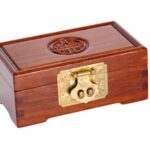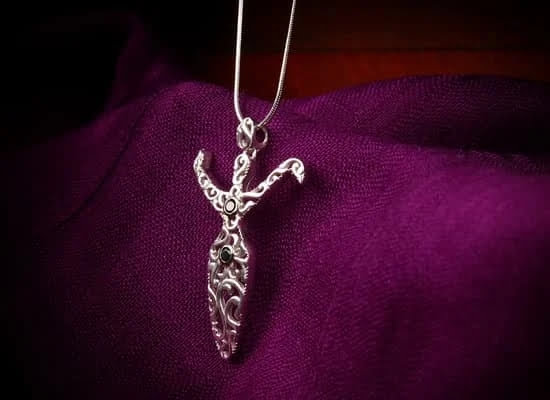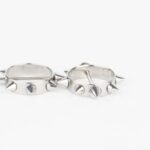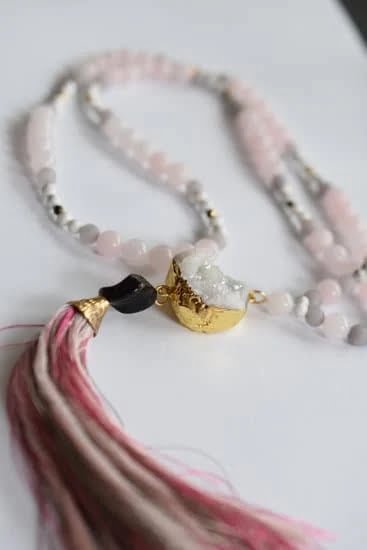Gold jewelry has long been a symbol of luxury, elegance, and prestige. From ancient civilizations to modern-day fashion trends, the allure of gold remains timeless. However, maintaining the lustrous shine of gold jewelry requires careful attention and proper cleaning methods.
Many individuals wonder: can you boil gold jewelry? In this article, we will delve into the properties of gold, explore the idea of boiling gold jewelry as a cleaning method, discuss potential risks and benefits, and provide alternative cleaning methods for preserving the beauty of gold jewelry.
Understanding the properties of gold is essential in determining the most effective way to clean and maintain its sparkle. Gold is known for its resistance to corrosion, tarnishing, and rusting due to its inherent chemical stability. This makes it generally easy to maintain; however, habitual wear can lead to accumulation of dirt and oils that may dull its shine. As such, various cleaning methods have been suggested over time to preserve its radiant appeal.
One such method that has gained attention is boiling gold jewelry. Some believe that submerging gold jewelry in boiling water can effectively remove impurities and restore its brilliance; however, there are also misconceptions and potential risks associated with this method that need to be addressed.
Additionally, alternative cleaning methods have been recommended by experts for ensuring the safety and longevity of gold jewelry. It is important to weigh these options carefully in order to make an informed decision on how best to care for your prized possessions.
Properties of Gold
Gold is a popular choice for jewelry due to its timeless beauty and luster. Understanding the properties of gold can help in determining the best cleaning methods to maintain its shine. Gold is a soft metal with a high level of malleability and ductility, making it susceptible to damage from harsh cleaning methods or chemicals. Additionally, pure gold is not prone to tarnishing like other metals, but it does accumulate dirt and oils over time that can dull its appearance.
When considering cleaning gold jewelry, it’s important to understand how gold responds to different methods. Ammonia-based cleaners and harsh chemicals can potentially damage gold jewelry, causing discoloration or weakening of the metal. On the other hand, gentle cleaning methods using mild soap and water or professional cleaning services can effectively remove dirt and oils without risking damage to the jewelry.
Properties of Gold
- Soft metal with high malleability
- Susceptible to damage from harsh cleaning methods
- Does not tarnish easily but accumulates dirt and oils
Understanding these properties can you boil gold jewelry in identifying proper care techniques for maintaining its beauty. Boiling gold jewelry may be tempting as a method of deep cleaning, but the risks associated with this method may outweigh any potential benefits.
Boiling Gold Jewelry
Gold jewelry has been a timeless and cherished accessory for centuries, coveted for its lustrous shine and enduring value. As such, it is important to explore the various methods of cleaning and maintaining gold jewelry to ensure it retains its beauty over time. One common question that arises when discussing the care of gold jewelry is whether boiling it is a viable cleaning method.
Boiling gold jewelry may seem like an effective way to remove built-up grime and restore its brilliance. However, it is essential to understand the properties of gold and how it responds to different cleaning methods before attempting this approach. Gold is a relatively inert metal, meaning it does not easily react with other substances, making it resistant to tarnishing and corrosion. Its softness also allows for easily removable dirt or debris.
Before proceeding with boiling gold jewelry, there are several considerations to keep in mind:
- The type of gold: Not all gold jewelry can withstand the heat from boiling water. Pure 24-karat gold is more susceptible to damage from high temperatures compared to lower karat alloys.
- Gemstone settings: If your gold jewelry features gemstones, boiling it can cause damage to delicate stones or weaken their settings.
- Other delicate features: Items such as enamel or delicate engravings on gold pieces can be affected by exposure to high temperatures.
When weighing the risks and benefits associated with boiling gold jewelry, it becomes clear that there are alternative methods that can effectively clean your precious pieces without the potential for damage.
Using mild soap and water, along with a soft brush or cloth, can safely remove dirt and oils from your gold jewelry. Professional cleaning services are also available for more intricate pieces or those requiring extra care. These alternative methods provide a gentle approach to preserving the beauty of your gold jewelry without exposing them to unnecessary risks.
Risks and Benefits
Boiling gold jewelry has long been a debated topic when it comes to cleaning this precious metal. Many people wonder whether boiling gold jewelry is safe or if it will damage the item. Gold is a relatively soft metal, which makes it susceptible to damage from harsh chemicals or extreme temperatures, including boiling water. While some sources claim that boiling gold jewelry can effectively clean and restore its shine, there are potential risks involved in this method.
When considering the potential risks of boiling gold jewelry, one must understand that excessive heat can cause damage to the metal, especially if the gold piece contains gemstones or other delicate embellishments. The high temperature of boiling water can lead to discoloration, warping, or even structural damage to the jewelry. Additionally, exposure to extreme heat can weaken any soldered parts of the jewelry, leading to potential breakage or detachment of components.
Despite these risks, some jewellers and experts believe that boiling gold jewelry in plain water for a short period of time can actually be beneficial in removing dirt and oils from its surface. This method may help restore the luster and shine of the gold while eliminating any buildup that has accumulated over time. However, it’s important to note that this may not be suitable for all types of gold jewelry and should be approached with caution.
| Risks | Benefits |
|---|---|
| Excessive heat can cause damage | May remove dirt and oils from the surface |
| Discoloration and warping | Restores luster and shine |
Alternative Cleaning Methods
When it comes to cleaning gold jewelry, many people may question whether boiling their pieces is a safe and effective method. While some may swear by this technique, it’s important to consider alternative cleaning methods that provide the same shine without the potential risks associated with boiling. Using mild soap and water or seeking professional cleaning services are two widely accepted alternatives that
Mild Soap and Water
One of the safest and most common ways to clean gold jewelry at home is by using mild soap and water. This method involves mixing a small amount of mild dish soap with warm water in a bowl or sink. Submerge your gold jewelry in the solution for a few minutes, then gently scrub them with a soft-bristled brush to remove dirt and grime. Afterward, rinse the pieces under lukewarm water and pat dry with a soft cloth.
Professional Cleaning Services
For those seeking a more hands-off approach to cleaning their gold jewelry, professional cleaning services are readily available at many jewelry stores. Trained professionals can expertly clean and inspect your pieces to ensure they remain in excellent condition.
These services often involve ultrasonic cleaning, steam cleaning, polishing, and rigorous inspection for any necessary repairs. While these options may come at an additional cost, they can be well worth the investment when it comes to preserving the beauty and value of your gold jewelry.
While boiling gold jewelry may seem like an efficient way to restore its shine, there
Precautions
Boiling gold jewelry, or any precious metal for that matter, can be a controversial topic when it comes to cleaning methods. While some people swear by the effectiveness of boiling gold jewelry to restore its shine, others believe it could cause irreparable damage. If you are considering boiling your gold jewelry, there are several precautions you should take to ensure the process is as safe and effective as possible.
First and foremost, it is important to understand that not all types of gold jewelry are suitable for boiling. In general, solid gold pieces without gemstones or other embellishments are the safest candidates for this cleaning method. Gold-plated or hollow pieces may not fare well when exposed to high heat and can become warped or damaged in the process.
Furthermore, temperature control is crucial when boiling gold jewelry. It is recommended to use a gentle simmer rather than a rolling boil to reduce the risk of overheating and potentially damaging the jewelry. Using a thermometer to monitor the water temperature and avoid exceeding 140°F (60°C) can help prevent any adverse effects on the gold.
In addition to these precautions, it is essential to thoroughly assess each piece of gold jewelry before attempting to boil it. Any loose stones, delicate settings, or intricate designs may be compromised by the boiling process. In these cases, alternative cleaning methods such as using mild soap and water or seeking professional cleaning services may be more suitable for maintaining the beauty of your gold jewelry.
| Precautions | Details |
|---|---|
| Types of Gold Jewelry Suitable for Boiling | Solid gold pieces without gemstones or embellishments |
| Temperature Control | Gentle simmer under 140°F (60°C) |
| Jewelry Assessment | Avoid boiling pieces with loose stones, delicate settings, or intricate designs |
Dos and Don’ts
Do: Use Gentle Cleaning Methods
When it comes to cleaning gold jewelry, it is essential to use gentle methods to avoid damaging the precious metal. One of the safest and most effective ways to clean gold jewelry is by using mild soap and water. By mixing a few drops of mild dish soap with warm water, you can create a gentle cleaning solution that won’t harm your gold jewelry.
Don’t: Use Harsh Chemicals
It is important to avoid using harsh chemicals or cleaners on gold jewelry as they can cause damage to the metal and gemstones. Substances such as bleach, chlorine, and strong detergents should be completely avoided when cleaning gold jewelry. These harsh chemicals can cause discoloration, tarnishing, and even deterioration of the metal itself.
Do: Seek Professional Cleaning Services
For delicate or complex pieces of gold jewelry, it is highly recommended to seek professional cleaning services from a jeweler. Professionals have the expertise and tools necessary to safely clean and maintain your gold jewelry without causing any damage. They can also inspect your jewelry for any loose stones or other issues that may need attention.
Don’t: Clean Gold Jewelry With Toothpaste
Contrary to popular belief, using toothpaste as a cleaner for gold jewelry is not recommended. The abrasive nature of toothpaste can cause micro-scratches on the surface of the gold, leading to a dull appearance over time. It’s best to stick with mild soap and water or seek professional cleaning services for maintaining the shine and beauty of your gold jewelry.
Conclusion
In conclusion, the allure of gold jewelry is undeniable, and it is essential to understand the best methods for cleaning and maintaining its beauty. While there has been some speculation about whether boiling gold jewelry is a viable cleaning method, it is crucial to approach this option with caution.
Boiling gold jewelry can be effective in removing dirt and grime, but it also carries potential risks such as damage or discoloration. Therefore, it is important to consider alternative cleaning methods that are safer and more suitable for preserving the integrity of your precious pieces.
Understanding the properties of gold is essential when determining the appropriate cleaning method. Gold is a relatively resilient metal, but it can still be susceptible to damage from harsh chemicals or excessive heat.
As such, using mild soap and water or seeking professional cleaning services are recommended as safer alternatives for maintaining the luster of your gold jewelry. Additionally, taking precautions such as controlling the boiling temperature and selecting suitable types of gold jewelry for this method can help minimize the risks associated with boiling.
In summary, while boiling gold jewelry may seem like a convenient solution for cleaning, it carries potential risks that should not be overlooked. It is advisable to opt for gentler cleaning methods that can effectively preserve the beauty of your gold jewelry without compromising its quality. By following dos and don’ts and taking necessary precautions, you can ensure that your prized pieces remain radiant and lustrous for years to come.
Frequently Asked Questions
Will Boiling Water Damage Jewelry?
Boiling water can potentially damage certain types of jewelry, especially those with delicate gemstones or pearls. The heat from boiling water can cause these materials to crack or become discolored. Additionally, excessive heat can weaken the settings of some jewelry, leading to a potential loss of stones. It’s best to avoid exposing jewelry to boiling water whenever possible.
How Do You Sterilize Gold Jewelry?
To sterilize gold jewelry, you can use a solution of mild dish soap and warm water. Soak the gold jewelry in this solution for a few minutes, then gently scrub it with a soft-bristled brush to remove any dirt or bacteria.
Rinse the jewelry thoroughly under running water and pat it dry with a clean cloth. Avoid using harsh chemicals or abrasive cleaners on gold jewelry, as they can damage its surface.
Can You Boil Gold Plated Jewelry?
It is not recommended to boil gold plated jewelry. The high heat and moisture from boiling water can cause the thin layer of gold plating to peel off or become damaged.
Instead, it’s best to clean gold plated jewelry using gentle methods such as soaking it in soapy water and gently wiping it with a soft cloth. Avoid exposing gold plated jewelry to harsh chemicals or abrasive materials that can harm the delicate plating.

Welcome to my jewelry blog! My name is Sarah and I am the owner of this blog.
I love making jewelry and sharing my creations with others.
So whether you’re someone who loves wearing jewelry yourself or simply enjoys learning about it, be sure to check out my blog for insightful posts on everything related to this exciting topic!





